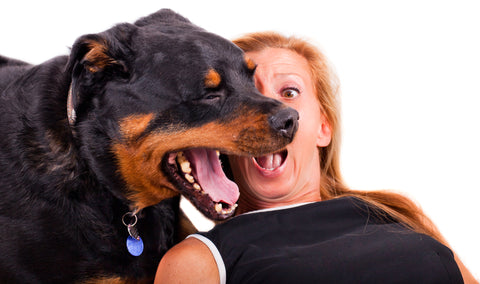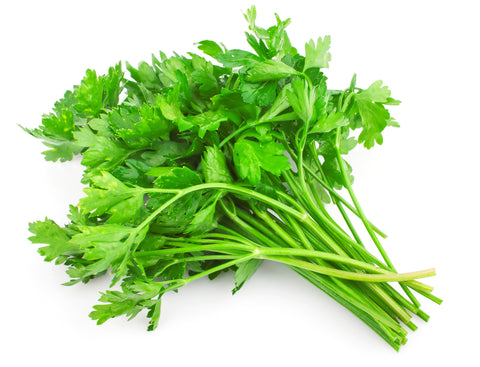February 3, 2022
Mitch Wilder
February is National Pet Dental Health Month
Bad Breath & Dental Disease
*Updated February 1, 2024
USE CODE: DENTAL25 for 25% OFF Sitewide. Offer ends Sunday February, 4 2024
Many of us love Doggy kisses but your Dogs Bad Breath makes it an unpleasant experience. Bad Breath can predict Gastrointestinal issues or Dental Problems.
What causes Unpleasant Dog Breath?
Bad breath could be a result of digestive problems which is sometimes treated with meds ( Flagyl, Tylasin or Prednisone), supplements ( Probiotics, Digestive enzymes) and/or novel protein or LID foods.
Many times your Dogs Bad Breath is a result of poor dental hygiene.
We all brush our own teeth daily but according to one study only 7% of dog parents brush their dog’s teeth daily and 80% of dogs will develop some type of dental disease by age 2. A commonly diagnosed problem in dogs is gum disease which can lead to bone loss, loss of teeth, gum infections and can even shorten your dog's life. Left untreated, dental disease may affect the heart, lungs, kidney, and other major organs.
Signs of dental disease in dogs include:
-
Red gums
-
Bleeding gums
-
Plaque
-
Bad breath
-
Blood in water or food bowls
-
Thick saliva
-
Favoring one side of the mouth
-
Dropping food while eating
-
Facial swelling
-
Rubbing the face with the paws or on the floor
Why your Dogs teeth are so important?

Dogs do not have hands as we do so they use multiple types of teeth for multiple tasks including, grasping, lifting, pulling, tearing, grinding, chewing, fighting or defending
Canine teeth that look like pointed fangs are particularly effective for grabbing and tearing food or as a biting defense or offense.
Carnassial are the cheek teeth found in carnivorous animals. They are large and pointy which allows them to shear flesh and bone in a slicing action. Carnassial teeth are the upper fourth premolar and the lower first molar.
Premolars are located behind the canine teeth. The function of the premolar is to hold and cut food into digestible pieces
Molars are located behind the premolars. The function of the premolar is to grind food
Incisors are the small teeth found at the front of a dog’s mouth and are designed for tearing, nibbling, and grooming.
What Veterinarians recommend to prevent Dental disease
🦷 Brushing your dog’s teeth daily with dog toothpaste.
🦷 Booking them for a professional Dental Prophy ( teeth cleaning) yearly. The issue with this is that it’s pricey (In some locations up to $600) and your dog must be anesthetized (render them unconscious) which is not ideal for immune-compromised or elderly dogs
There are companies offering Non-anesthetic dental (NAD)

NAD'S involve a dental technician who utilizes special holds to firmly secure your dog and then uses dental tools to scrape tartar away and ends with a thorough toothbrushing with toothpaste. These procedures are quick, more cost-effective (sometimes 40% less), have no recovery time, but. according to Veterinary Practice News... "The sharp instruments required for a proper cleaning can lacerate delicate gingival tissues if the patient moves, which is repeatedly seen and reported. Jaw fractures and neck injuries have been seen following restraint for NAD cleanings, and the risk for aspiration pneumonia from the lack of intubation is of high concern." Additionally, there are dogs who are not candidates and will not allow their mouths to be touched. With my former dogs Buddy & Bear I did not brush their teeth but I had the Non-anesthetic dental (NAD) performed many times and they fared well. NOTE- These procedures are typically performed within a Veterinarians office.
3 Hands-Free ways to help reduce Dental Disease

-
Healthymouth natural dental water additive is clinically proven to reduce plaque by as much as 76%
-
Bully Sticks are ideal as they are a delicious fully digestible treat that can be given daily. Bully Sticks massage gums, remove tartar from teeth, satisfy a dog's instinctual need to chew, and, in one study reduced the number of bacteria on the teeth by 60.92%.
-
Beef Cheeks are delicious, long lasting and have dental benefits. One of our influencers suggested that it took her German Shepherds many hours to devour them.
MYTH - Kibble Cleans a dogs Teeth 

Contrary to popular belief Kibble is not abrasive enough to clean teeth and in fact it coats them with a layer of debris. One exception is if the Kibble contains an added ingredient that kills bacteria it could be beneficial.
Natural Tip for Bad Breath
Parsley is a wonderful dog breath freshener as it contains Limonene which helps kill bad bacteria in the mouth. Parsley also contains the following Antioxidants and Vitamins; Vitamin K, Vitamin C, Carotenoids, and B vitamins.
The Danger of Dental Neglect
Your dog's mouth can be infected with a severe gum disease called Periodontitis. Its a silent disease until it reaches its advanced stages, but gum disease can cause gum erosion, chronic pain, tooth loss and bone loss. The spread of Oral bacteria can affect the Heart, Liver or Kidneys.

Dental neglect can also really hurt the pocketbook. If your dog requires major dental work they might have to see a Board Certified Veterinary Dentist and pricing is comparable to a human Orthodontist, Oral Surgeon or Prosthodontist. A Root Canal with a Cap can set you back anywhere from $1,500 to $6,000 a tooth.







Leave a comment